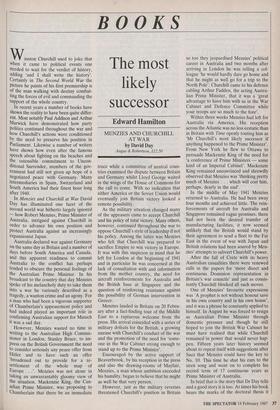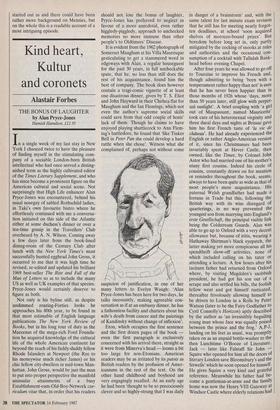BOOKS
The most likely successor
Edward Hamilton
MENZIES AND CHURCHILL AT WAR by David Day Winston Churchill used to joke that when it came to political events one needed to wait for the verdict of history, adding 'and I shall write the history'. Certainly in The Second World War the picture he paints of his first premiership is of the man walking with destiny combat- ting the forces of evil and commanding the support of the whole country. In recent years a number of books have shown the reality to have been quite differ- ent. Most notably Paul Addison and Arthur Marwick have demonstrated how party politics continued throughout the war and how Churchill's actions were conditioned by the need to preserve his position in Parliament. Likewise a number of writers have shown how even after the famous speech about fighting on the beaches and the ostensible commitment to Uncon- ditional Surrender, members of the gov- ernment had still not given up hope of a negotiated peace with Germany. Many intermediaries in Spain, Switzerland and South America had their finest hour long after 1940.
In Menzies and Churchill at War David Day has illuminated one facet of the second world war hitherto largely ignored — how Robert Menzies, Prime Minister of Australia, intrigued against Churchill in order to advance his own position and protect Australia against an increasingly expansionist Japan.
Australia declared war against Germany on the same day as Britain and a number of days before South America and Canada, and this apparent readiness to commit Australia to the conflict has perhaps tended to obscure the personal feelings of the Australian Prime Minister. In his broadcast to the country that day Menzies spoke of his melancholy duty to take them into a war he variously described as a tragedy, a wanton crime and an agony. For a man who had been a vigorous supporter of Chamberlain's appeasement policy and had indeed played an important role in confirming Australian support for Munich it was a sad day.
However, Menzies wasted no time in writing to the Australian High Commis- sioner in London, Stanley Bruce, to im- press on the British Government the need to consider seriously any peace offer from Hitler and to have such an offer `broadened out to provide for a re- settlement of the whole map of Europe . . .'. Menzies was not alone in taking an unwarrantably gloomy view of the situation. Mackenzie King, the Can- adian Prime Minister, was proposing to Chamberlain that there be an immediate
Angus & Robertson, f12.50
truce while a committee of neutral coun- tries examined the dispute between Britain and Germany whilst Lloyd George waited in the wings of the House of Commons for the call to come. With no indication that either America or the Soviet Union would eventually join Britain victory looked a remote possibility.
As the military situation changed many of the appeasers came to accept Churchill and his policy of total victory. Many others, however, continued throughout the war to oppose Churchill's style of leadership if not his policy. Among the latter was Menzies who felt that Churchill was prepared to sacrifice Empire to win victory in Europe. It was with this suspicion in mind that he left for London at the beginning of 1941 and in particular he was concerned at the lack of consultation with and information from the mother country, the need for aircraft reinforcements for Australia and the British base at Singapore and the question of reinforcing resistance against the possibility of German intervention in Greece.
Menzies landed in Britain on 20 Febru- ary after a fact-finding tour of the Middle East to a rapturous welcome from the press. His arrival coincided with a series of military defeats for the British, a growing unease with Churchill's conduct of the war and the promotion of the need for 'some- one in the War Cabinet strong enough to stand up to the Prime Minister'.
Encouraged by the active support of Beaverbrook, by his reception in the press and also the drawing-rooms of Mayfair, Menzies, a man whose ambition exceeded his humility, began to believe that he might as well be that very person.
However, just as the military reverses threatened Churchill's position in Britain so too they jeopardised Menzies' political career in Australia and two months after arriving in London he was telling a col- league 'he would hardly dare go home and that he might as well go for a trip to the North Pole'. Churchill came to his defence cabling Arthur Fadden, the acting Austra- lian Prime Minister, that it was a 'great advantage to have him with us in the War Cabinet and Defence Committee while your troops are so much to the fore'.
Within three weeks Menzies had left for Australia via America. His reception across the Atlantic was no less ecstatic than in Britain with Time openly touting him as `Mr Churchill's most likely successor if anything happened to the Prime Minister'. From New York he flew to Ottawa to persuade Mackenzie King of the need for `a conference of Prime Ministers — some kind of an Imperial Cabinet'. Mackenzie King remained unconvinced and shrewdly observed that Menzies was 'thinking pretty much of Menzies . . . which will cost him, perhaps, dearly in the end'.
In the middle of May 1941 Menzies returned to Australia. He had been away four months and achieved little. The rein- forcements of aircraft for Australia and Singapore remained vague promises, there had not been the desired transfer of manufacturing facilities, it now seemed unlikely that the British would stand by their agreement to send a fleet to the Far East in the event of war with Japan and British relations had been soured by Men- zies' attempts to subvert Churchill's power.
After the fall of Crete with its heavy Australian casualities there were renewed calls in the papers for 'more direct and continuous Dominion representation in Britain's war councils' and just as consis- tently Churchill blocked all such moves.
One of Menzies' favourite expressions was 'A prophet is not without honour save in his own country and in his own house', and it was a phrase he constantly applied to himself. In August he was forced to resign as Australian Prime Minister through domestic pressure and though he still hoped to join the British War Cabinet he must have realised that while Churchill remained in power that would never hap- pen. Fifteen years later history seemed about to repeat itself with suggestions after Suez that Menzies could have the key to No. 10. This time he shut his ears to the siren song and went on to complete his record term of 17 continuous years as Prime Minister of Australia.
In brief that is the story that Dr Day tells and a good story it is too. At times his book bears the marks of the doctoral thesis it started out as and there could have been rather more background on Menzies, but on the whole this is a readable account of a most intriguing episode.



























































 Previous page
Previous page